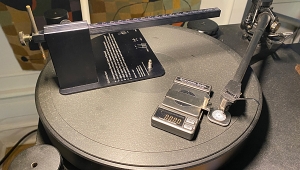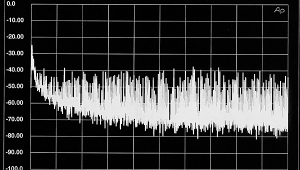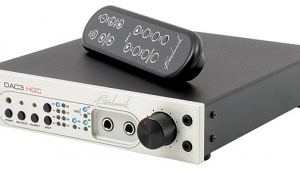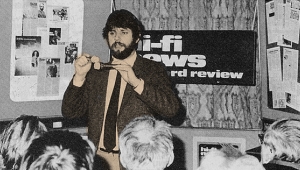| Columns Retired Columns & Blogs |
A Babel, a Babble . . . Page 3
Norton: The technical results are going to have to be separate from the main body of the text for most of us anyway because the measurements are going to be done here in Santa Fe. There's no way we can mesh these two together.
Footnote 5: Arnis Balgalvis, Larry Greenhill, and Gary A. Galo.
Balgalvis: I'm glad you brought that up—there are three writers here who used to work with High-Performance Review (footnote 5). I have to confess that whenever I had to do the technical section of a review, it was just a tedious thing. The graphs were there, and you tried to put them into in words, which was kind of nice. But I never felt that it was really contributing anything.
Galo: I share Arnie's frustration with what we had to do for High-Performance Review. We were sent a bunch of data from their lab and we had to write it into our review. It was a very difficult thing to do. And it was less than satisfactory.
Balgalvis: But if the person who did the measurements would then try to explain what's going on, and then maybe converse with the particular reviewer of the product, it would be more effective. I have to say that a lot of Stereophile's reviews are already structured in a format where you can skip around the technical discussion, either to the conclusion or to read the introduction or the description of the product...[agreement]...But I do think that it is important to stick some technical reasoning behind what is being heard. It has probably something to do with the fact that I have an engineering background. I have a little bit of a vested interest in that, yes, we hear certain things which we can't explain today, but I should certainly hope that in a few years we can go ahead and say, "It sounds this way because of this particular measurement."
Robert Deutsch: I agree with Arnie in that I sense that the majority of readers do not read an individual report from beginning to end. They have a look at what the product is, to see whether they're interested in it. They read the introduction, and I think they do skip past the technical part. They read the conclusion: "Does this person like the product?" And if the reviewer does and they're interested in it, then they might read part of the technical stuff and look at some of the graphs. If the reviewer basically doesn't like the product, if he says, "Well, technically the product seems competent. However, I have some reservations about its sound," then the reader won't bother going back to the technical part unless it's for the sake of interest.
Holt: I have had the feeling from time to time, and right now I think I'm having it again, that a lot of the body of our equipment reviews is aimed not at the readers, but at manufacturers.
Lipnick: I don't know if I agree with that completely, but there's something I think we have to keep in mind. We're in sort of an ivory tower, we deal with manufacturers and we talk among ourselves. But we have to put ourselves in the boat of someone who doesn't have a chance to do all this, who's just a poor consumer who reads this stuff and wants to spend money and buy equipment. They don't know from nothing, basically. When people read a review, they want to find out, basically, what something sounds like! When they read a review, they want to find out what the guy likes or doesn't like. When people read the mass-market magazines, they say, "When I finish reading the review of a product in a typical blah-blah-blah magazine, I don't know what it sounds like." When I finish reading a review, anyone's review, if I finish that review and I say to myself, "Gee, I really don't know what it sounds like," it's not a good review...[hubbub]...The technical aspects are important. You can discuss technical stuff all day long! But technical stuff does not explain how it sounds. You've got to at least tell the readers what it sounds like. Because they're buying something to reproduce music.
Atkinson: You have a hierarchy here. You have the conclusion: "Did the reviewer like it or not?" You have the sound: "What did it sound like? Why didn't he like it, or why did he like it?" Then some measurements that say: "Well, maybe this was why it sounded like that." Then, perhaps at the very bottom, you have the product description: how many knobs, where they are, whether the power button is marked "On" or "Power"...You could say about Stereo Review that they turn that hierarchy upside-down.
Lipnick: Exactly. But if the review does not tell the reader when they're finished what this product sounds like, it is not a good review. Period. I mean, it just isn't. Because again, when you talk about high-end audio you're talking about the minute nuances and finesse of high-performance audio. We're not just talking about another appliance that you're buying for your home. And we lose sight of that, I think.
Atkinson: The fact that you said "minute nuances and finesse" reminds me of something. One of the things that came out of our listening tests at the show in April was that maybe some of the differences we describe in great detail are quite small to a lot of people.
Mitchell: Well, well, absolutely.
Balgalvis: That's very true, in many cases the nuances are subtle. Maybe they're very important to us, but what Lew is saying is also my feeling: yes, you have to describe what the product sounds like. But you have to describe what the feel of the equipment is, let's say the difference between a Mark Levinson product and a Krell. Because people are going to go out there and they're going to spend thousands of dollars. I feel that you have to somehow convey a feel for what they're going to get for that money in addition to the sound.
Holt: I have the feeling, though, that these things that we call "minute differences," anyone who is into audio at all, anyone who listens, can hear these things. And probably hear them quite well. The difference, as I see it, between an experienced reviewer and a consumer is that we're able to pick up on these things faster...
Balgalvis: ...and describe them.
Holt: But if the person buys the thing, and lives with it, he'll come to hear the same stuff that we're reporting.
Atkinson: And then it will be important to him or her.
Olsher: I'd just like to summarize what I think I hear, and that is that opinions should remain dominant over measurement in the magazine. Measurement is important, it provides a context for assessing the merits of the product, but ultimately it's the opinion that counts.
Holt: But if there's a continuing conflict between the measurements and the opinions?
Footnote 5: Arnis Balgalvis, Larry Greenhill, and Gary A. Galo.
- Log in or register to post comments




































